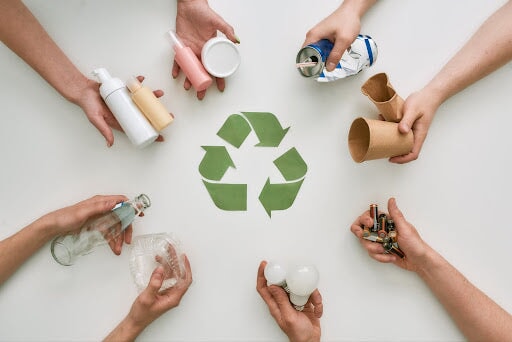
TLDR
Waste—it's a word that echoes through our daily lives, often without us giving it much thought. From the discarded wrappers of our morning snack to the old electronics gathering dust in our homes, waste is an intrinsic part of modern living. But have you ever stopped to consider the profound impact it has on our environment? Did you ever question how to reduce water waste or any type of waste in your daily life? In this article, we'll delve into the various types of waste, exploring their categories, sources, and most importantly, different ways to reduce waste.
Breaking Down the Primary Categories of Waste
Organic Waste
Organic waste is a broad term that encompasses all plant- and animal-based materials that can decompose naturally. This includes food scraps, yard trimmings, paper, cardboard, and even some types of plastic. When organic waste is composted, it breaks down into nutrient-rich soil that can be used to grow new plants. This process helps to reduce the amount of waste that goes into landfills, and it also helps to improve soil quality.
Organic waste is a valuable resource that can be used to help sustain life on Earth. By composting organic waste, we can help to reduce pollution, improve soil quality, and create a more sustainable future.
Hazardous Waste
Hazardous waste, on the other hand, paints a graver picture. When we talk about hazardous waste, we are referring to a category of waste that, if improperly managed or disposed of, can pose significant threats to human health and the environment. This is not your everyday household trash; rather, it's waste that contains dangerous properties, which can be harmful even in small amounts.
Common types of hazardous waste include:
- Chemicals: Chemicals, a major component of hazardous waste, range from industrial by-products to household agents, and can contaminate water and food supplies, causing various health problems including cancers and reproductive issues.
- Batteries: Batteries, containing heavy metals like lead and mercury, can leach into the environment, accumulate in living organisms, and cause severe health risks including nervous system and kidney damage.
- Medical Waste: Improperly handled medical waste, including used needles and infectious materials, poses a risk of spreading infectious diseases, particularly to healthcare workers, waste handlers, and the broader community.
Solid Waste
Solid waste is a broad category encompassing a range of everyday items we discard, such as packaging materials, food scraps, clothing, and household goods. While seemingly harmless, the accumulation of solid waste in landfills can have insidious effects on the environment. The decomposition of organic waste produces methane, a potent greenhouse gas, contributing to climate change. Moreover, the presence of non-biodegradable items, such as plastics, in solid waste, can lead to long-term environmental degradation, impacting both landscapes and wildlife.
Liquid Waste
Often overlooked, liquid waste is another diverse category, encompassing wastewater originating from domestic households, industrial processes, and medical facilities. This type of waste includes everything from wash water and used oils to industrial discharges and chemical waste. If not treated adequately, liquid waste can lead to the contamination of water bodies such as rivers, lakes, and oceans, harming aquatic ecosystems and jeopardizing human health through the contamination of drinking water sources. The treatment and proper disposal of liquid waste are, therefore, critical in safeguarding both environmental and public health..
Recyclable Waste
Recyclable waste includes materials like plastics, paper, glass, and metals, which can be reprocessed and transformed into new products. Recycling plays a crucial role in conserving natural resources, reducing the need for raw materials, and minimizing environmental impacts associated with resource extraction and waste disposal. By redirecting recyclable materials away from landfills, we can significantly reduce the strain on our environment and foster a more sustainable and circular economy. The active participation of both individuals and industries in recycling programs is vital in maximizing the benefits of this process and ensuring a more sustainable future.
How Each Type of Waste Impacts Our Environment
Understanding the implications of each type of waste is paramount to realizing the urgency of responsible waste management.
- Solid Waste: Landfills brimming with solid waste emit greenhouse gasses, contributing to climate change. Additionally, improper disposal can lead to soil and water pollution.
- Hazardous Waste: If not handled with care, hazardous waste can seep into the soil and contaminate groundwater, jeopardizing both flora and fauna.
- Recyclable Waste: Failure to recycle leads to the depletion of natural resources, as well as increased energy consumption in the production of new materials.
Common Sources of Waste
In our fast-paced world, waste is an inevitable byproduct of progress. Understanding its origins is crucial in our collective endeavor to reduce its impact. Let's delve into the common sources that feed the ever-growing waste stream:
- Industrial Waste: Industries are the powerhouses of production, generating vast quantities of waste. From manufacturing processes to packaging materials, industrial waste includes everything from discarded machinery parts to chemical byproducts. Without responsible disposal practices, this waste can pollute air, water, and soil, posing a significant threat to both human health and the environment.
- Commercial Waste: The bustling realm of commerce is a significant contributor to the waste dilemma. Retail operations, offices, and businesses of all sizes generate a spectrum of waste, including packaging materials, obsolete electronics, and office supplies. Streamlining waste management practices in commercial sectors is essential to mitigating its environmental impact.
- Household Waste: Perhaps the most familiar category, household waste encompasses the refuse generated in our daily lives. It spans from food scraps to packaging, old furniture, and electronic appliances. The challenge lies in separating recyclables from non-recyclables, ensuring that waste is disposed of in a manner that minimizes its harm to the environment.
- Agricultural Waste: The backbone of our food supply chain, agriculture is also a notable contributor to waste. This category includes organic waste like crop residues, animal manure, and agricultural byproducts. While some of this waste can be repurposed as compost or biofuel, improper disposal methods can lead to soil degradation and water contamination.
These sources collectively contribute to the mounting waste stream that our planet grapples with. Addressing each category's unique challenges requires a coordinated effort, involving industries, businesses, households, and agricultural practices. It's imperative that we adopt sustainable waste management practices to safeguard our environment for future generations.
Why Reducing Waste Matters
It's not just about decluttering our surroundings; it's about safeguarding our planet's future. Reducing waste:
- Conserves Resources: By recycling and reusing, we decrease the demand for raw materials, conserving forests, minerals, and energy.
- Mitigates Pollution: Responsible waste management prevents pollutants from infiltrating our air, water, and soil, preserving the delicate balance of our ecosystems.
- Fosters Sustainability: A reduction in waste production aligns with a more sustainable and eco-conscious way of living, paving the way for a healthier planet.
Reel Paper: Pioneers in Waste Reduction
In the pursuit of a sustainable future, companies like Reel Paper are leading the charge. By offering innovative, tree-free paper products, such as our recycled paper towels and bamboo toilet paper, we do our best in addressing the root cause of waste—the traditional method of paper production. Reel's commitment to quality and convenience is paired with an unwavering dedication to environmental stewardship, making us a beacon of hope in the battle against waste.
Understanding the intricacies of waste is the first step towards meaningful change. By recognizing the different types and their impact, we can collectively strive for a future where waste is minimized, and our planet thrives. With the efforts of conscious consumers and trailblazing companies like Reel Paper, this future is well within reach. It's time for a reel change.



0 comments